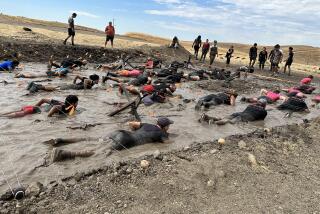Mystery illness may be tied to Playboy Mansion’s famed grotto
- Share via
The bacteria that cause Legionnaires’ disease have been found in the Playboy Mansion’s grotto, the famed artificial cave that houses a whirlpool spa.
The bacteria, legionella pneumophila, are a suspect in the illnesses among attendees of a DomainFest fundraiser at the Playboy Mansion in Los Angeles on Feb. 3. Legionella bacteria can cause serious illness, including pneumonia. H1N1 flu is also a suspect in the outbreak.
Previously, health authorities had said only that the bacteria legionella pneumophila were identified at a whirlpool spa at the Playboy Mansion. The precise location of that spa was made public during a presentation by Dr. Caitlin Reed at a conference of the Centers for Disease Control and Prevention in Atlanta last week. The Times reviewed a copy of the presentation on Friday.
In her presentation, Reed presented data showing that among everyone who attended the conference, the highest risk of illness was found to be in people who attended the Playboy Mansion party on Feb. 3, as opposed to people who attended parties at hotels.
Reed presented a classic whodunit public disease investigation in her presentation. Twitter, Facebook and an online poll were key tools to help scientists track down the source of illness.
Los Angeles County health officials were spurred into action on Feb. 11 after receiving a call from a journalist about the large number of illnesses following a DomainFest convention on Feb. 1-3; many attendees had begun writing on blogs and social media about widespread illnesses among conference attendees.
On Feb. 7, for example, a person wrote on his Facebook page, “Domainerflu count: Who else caught the disease at DFG?” At least nine people were counted in the comments section. The presentation then quoted a Feb. 8 industry blog, DN Journal, that quoted the author’s daughter, a medical student, as writing that if “people are getting pneumonia” and “there is a suspected water source as the culprit,” then attendees should worry about bacterial infections and “definitely need to see their doctors. So many people getting sick in one place, sounds like a case for the CDC.”
Health investigators used an online poll sent to all 715 attendees of the conference to get a better handle on the disease outbreak. They received more than 400 responses from the attendees of the conference, which discusses the latest in the Internet industry.
The survey found that 123 people fell sick with fever and at least one other symptom, such as headache, cough, shortness of breath or aches. A key clue was that 69 people got sick on the same day, Feb. 5. That indicated that the outbreak was probably caused by a single source.
Reed’s presentation said social media were helpful in the disease investigation, which helped investigators identify the outbreak quickly, enabling them to receive responses quickly from attendees, who had traveled from 30 countries; and allowed for the issuing of speedy recommendations for patients to receive lab testing.
There were some negative side effects, the presentation said, including “wasted effort responding to rumors” and that it “amplified inaccurate media stories.”
The name of Legionnaires’ disease stems from its discovery in 1976 when attendees of an American Legion convention in Philadelphia became sick with the bacteria and developed pneumonia. About 8,000 to 18,000 people are hospitalized with the disease every year in the United States, according to the CDC.
Healthy people usually recover from the bacterial disease, which can be treated with antibiotics, but death can occur in 5% to 30% of cases, the CDC said.
A milder version of illness caused by Legionella bacteria is called Pontiac fever, which does not cause pneumonia but does cause fever, chills, cough and headaches.
Reed is a physician with the CDC’s Epidemic Intelligence Service ?- an elite group of disease scientists -- on loan to the Los Angeles County Department of Public Health.
A Playboy spokeswoman did not return a call for comment Friday morning.
More to Read
Sign up for Essential California
The most important California stories and recommendations in your inbox every morning.
You may occasionally receive promotional content from the Los Angeles Times.














